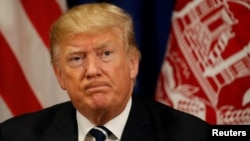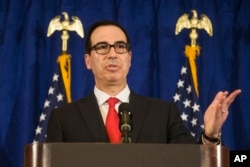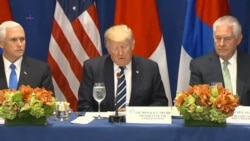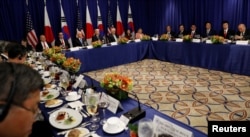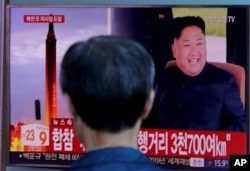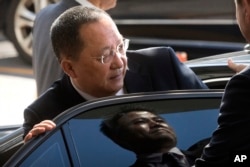The United States on Thursday further clamped down on North Korea's ties to the outside world, moving to sever any links between Pyongyang and banks outside the reclusive state.
"Foreign financial institutions are now on notice that going forward they can choose to do business with the United States or with North Korea, but not both," U.S. Treasury Secretary Steve Mnuchin told reporters in New York.
"This new executive order enables Treasury to freeze assets of anyone conducting significant trade in goods, services or technology with North Korea. It also allows us to freeze assets of actors supporting North Korea's textiles, fishing, IT and manufacturing industries," Mnuchin said.
Echoing the words of President Donald Trump earlier in the day, Mnuchin said Pyongyang has for too long "evaded sanctions and used the international financial system to facilitate funding for its weapons and mass destruction and ballistic missile programs."
Shipping, trade networks
The Trump administration is also specifically targeting North Korea's shipping and trade networks. Any plane or ship that has visited North Korea is prohibited from arriving in the United States for 180 days, according to a text of a notification letter Trump sent to the speaker of the House of Representatives.
WATCH: Trump Announces Executive Order Targeting Those Financing North Korea
"This is the right decision by the Trump administration," former U.S. Undersecretary of State R. Nicholas Burns told VOA.
"The U.S. and others need to increase the economic costs to Pyongyang for its illegal and destabilizing nuclear program," added Burns, a Harvard University professor and director of the Kennedy School's Future of Diplomacy Project.
"Today's action follows the approach used against Iran where countries, banks and individuals had to choose between Iran and the United States," said Anthony Ruggerio, a senior fellow at the Foundation for Defense of Democracies.
"North Korea relies on its international commercial and financial networks to procure items for its weapons programs, luxury goods for the elites and other items, and sanctions can restrict North Korea's revenue available for those purposes," Ruggiero, a former U.S. government specialist on targeted financial measures, told VOA.
In an exchange with reporters, Mnuchin said: "I'm not going to comment on what I expect North Korea to do. Obviously ... the objective is for them to stop their missile tests and give up their nuclear weapons."
China's central bank has also reportedly ordered the country's financial institutions to stop doing business with North Korea, action Trump called "a tremendous move" that was "somewhat unexpected."
Trump expressed thanks to Chinese President Xi Jinping for the move, saying "that was a great thing he did today."
EU eyes sanctions
The European Union has also reportedly agreed to impose tougher sanctions on Pyongyang, in addition to the latest round recently imposed by the U.N. Security Council.
Trump said tougher measures were being taken and it "is unacceptable that others financially support this criminal, rogue regime."
The comment was made as Trump had lunch in New York with Japanese Prime Minister Shinzo Abe and South Korean President Moon Jae-in.
Abe praised Trump for taking tougher action.
"Together with Donald, we've been successfully demonstrating our strong will to exercise pressure against North Korea, and that actually led to the unification of the international community to address this challenge," he said.
The prime minister later told reporters that at the meetings today with American and South Korean officials, "all agreed to apply utmost pressure so as to change North Korea's policies."
The United States helps provide for the defense of both Japan and South Korea. Strategic cooperation between the United States and its two key Asian allies has been further enhanced this year amid the rising threat from North Korea.
That has made China nervous, and it has called on all parties in the region to exercise restraint.
'Dangerous direction'
Addressing the U.N. General Assembly on Thursday, Chinese Foreign Minister Wang Yi said that Pyongyang should not continue in a "dangerous direction" with its nuclear program and that international negotiations are "the only way out."
Wang called on the parties to "meet each other halfway by addressing each other's legitimate concerns."
North Korea has justified its nuclear and ballistic missile development as a way to defend itself against a hostile United States.
Several years of warfare on the Korean Peninsula in the early 1950s, prompted by the North's invasion of the South, pitted China and the United States against each other in support of their respective allies.
There has been no immediate response from Pyongyang to the fresh actions taken by Washington and Beijing.
Following Trump's speech this week to the General Assembly, in which he singled out Kim Jong Un for criticism, North Korea's foreign minister, Ri Yong Ho, said if the U.S. president "was thinking he could scare us with the sound of a dog barking, that's really a dog dream."




